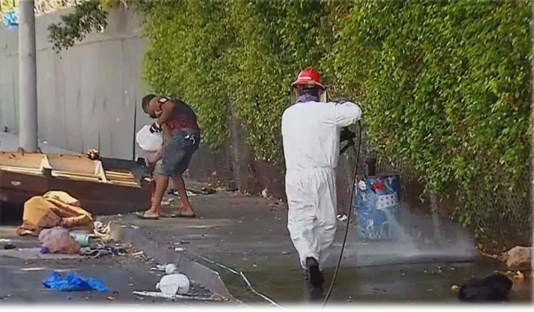Hepatitis 'A' Outbreak in the Homeless Community
- Details
- Category: Community News
- Published on Friday, 15 December 2017 11:20
- Written by Chin Thammasaengsri
Hepatitis A, an acute liver disease, has been on a steady rise here in Southern California especially among our homeless population. Over the past few years, the numbers of homeless have increased dramatically for a number of reasons ranging from the simple “bad break” (financially or on the job front) to battles with drugs and/or mental illness. We have watched as homeless “communities” appear under bridges, freeways, and even along our city streets.
 The formation of these communities beg the issue of sanitation. Homeless people, like the rest of us, have basic bodily functions that must be satisfied. You and I have the luxury of using restroom and shower facilities at home or at work along with abundant supplies of soap, water, and sanitizers. For the homeless, those facilities are not nearly as plentiful if simply nonexistent. Additionally, the issues of drug abuse, unsafe sex, and mental health compound the effort at disease control.
The formation of these communities beg the issue of sanitation. Homeless people, like the rest of us, have basic bodily functions that must be satisfied. You and I have the luxury of using restroom and shower facilities at home or at work along with abundant supplies of soap, water, and sanitizers. For the homeless, those facilities are not nearly as plentiful if simply nonexistent. Additionally, the issues of drug abuse, unsafe sex, and mental health compound the effort at disease control. As a result, Hepatitis A cases have spiked and are affecting those who deal with them on a regular basis, such as our police force. A LAPD Senior Lead Officer recently stated that 60% or more of their daily interactions are with the homeless, placing them at greater risk of exposure. In fact, as of this writing, at least one LAPD Officer who works the downtown beat has been confirmed as being exposed to this disease.
The average citizen is susceptible as well. Governor Jerry Brown, on October 13, 2017, declared a “statewide Hepatitis A outbreak.” This declaration directs the California Department of Public Health to coordinate its vaccine supply and boost state and local efforts to help reduce the spread of the disease.
Another group which exists inside of the homeless community, though NOT exclusively, are described as men who have sex with men (MSM). Los Angeles County Public Health has advised men in this category to be on alert. As of November 2, L.A. County Public Health has reported 12 cases of Hepatitis A among this group, which is up three from 2016. Nationally, spikes among this group have been seen in New York City and Colorado. Internationally, cases are spiking in Europe, Chile, and Australia.
Highly contagious, hepatitis is transmitted primarily by contact with the feces of an infected person. Contact can be facilitated through food, water, and sexual or other close contact. People suffering from acute Hepatitis A exhibit symptoms of fever, fatigue, nausea, vomiting, dark colored urine, abdominal pain, and jaundice, which is a yellowing of the skin or eyes. Controlling this disease is not difficult under normal circumstances. Personally, if you wash your hands after using the restroom, changing diapers, or before preparing food, instances of the disease are curtailed or eliminated altogether. Don’t share items that will allow you to come into contact with another person’s bodily fluids and don’t have sex with someone suffering from the disease.
On a wider level, be careful when doing clean-ups around your home or for community clean up activists be very cautious at or near sites that are frequented by the homeless. If possible, before any clean-up begins, hose down the work area so matter is washed away and dust is settled, wear basic P.P.E.’s (personal protective equipment) such as goggles, gloves, and N-95 breathing masks. Dust can carry “particles” containing fecal elements which carry the disease. Once done, take care when removing clothing and P.P.E.’s and wash or dispose of these items as needed. Do not touch your eyes or mucous membranes before you wash your hands. Finally, disinfect all public surfaces such as counters, door knobs, and restroom facilities regularly especially in areas frequented by the homeless.
The issue of homelessness is, by far, one of the most complex we face here in our society. It’s a problem that will be debated and discussed by minds far more qualified than mine. Can we solve it altogether? I can’t say. In the meantime, now that we know this issue brings with it safety concerns, we can work to mitigate it and keep our friends, family, and loved ones healthy and as clean as possible.
Chin Thammasaengsri is the Public Safety Liaison for the Mid City Neighborhood Council as well as a member of the CERT (Community Emergency Response Team) for Los Angeles.
